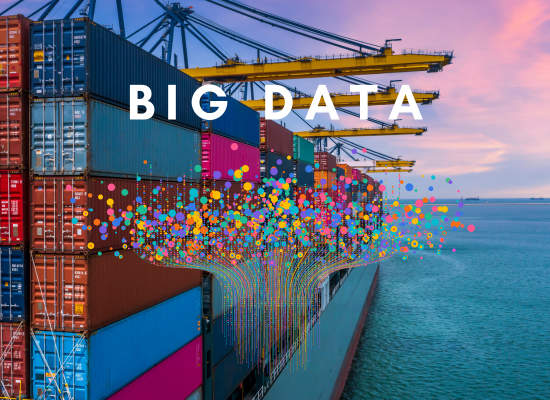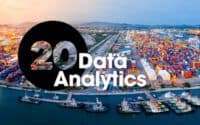30 Data-Driven Approaches to Dominate the Industry

From optimizing route planning to enhancing customer service, the integration of data analytics into maritime processes ensures that companies can navigate the complexities of modern shipping with greater agility and insight. Here, we explore the top 30 ways maritime data analytics can provide a competitive advantage, demonstrating its pivotal role in the industry’s future.
* Please send feedback/suggestions to editor @ shipuniverse.com
1. Optimized Route Planning
Efficient Navigation Decisions Maritime data analytics enables the optimization of shipping routes by analyzing historical data, weather conditions, and current maritime traffic. This approach helps in making informed navigation decisions that minimize travel time and fuel consumption.
2. Predictive Maintenance
Preventing Unplanned Downtime Using data analytics to predict when machinery or components are likely to fail allows for maintenance to be scheduled during non-critical times. This reduces unexpected downtime, extends the life of equipment, and cuts down on repair costs.
3. Enhanced Cargo Handling
Streamlining Operations Data-driven insights help improve the efficiency of cargo loading and unloading operations. By analyzing patterns and performance data, terminals can optimize their workflows, reducing bottlenecks and shortening the turnaround time for ships at port.
4. Dynamic Pricing Models
Maximizing Revenue Big data analytics can drive dynamic pricing strategies based on demand, capacity, route popularity, and market conditions. This allows shipping companies to adjust their pricing in real-time to maximize revenue and maintain competitive pricing.
5. Real-Time Weather Forecast Integration
Navigating Safely and Efficiently Incorporating real-time weather data into maritime operations helps in making proactive decisions that enhance safety and efficiency. Ships can alter their routes to avoid bad weather, minimizing risks and preventing delays.
6. Improved Fuel Efficiency
Reducing Operational Costs Data analytics allows for detailed monitoring and management of fuel usage. By analyzing fuel consumption patterns and correlating them with ship speeds, routes, and weather conditions, companies can identify ways to reduce fuel usage and thereby decrease overall operational costs.
7. Better Compliance with Environmental Regulations
Ensuring Sustainability Maritime data analytics helps shipping companies adhere to environmental regulations more effectively. By tracking emissions and other environmental impact data, companies can ensure compliance and avoid fines, while also promoting sustainable practices.
8. Enhanced Security Measures
Preventing Threats and Losses Utilizing analytics for security purposes includes monitoring and predicting potential threats, such as piracy or cargo theft. Data-driven insights allow companies to implement preventive measures and respond more effectively to incidents, enhancing overall security.
9. Crew Management Optimization
Enhancing Workforce Efficiency Data analytics can optimize crew management by analyzing work patterns, rest periods, and crew performance. Insights gained from this data help in scheduling and allocating crew members more efficiently, which can improve job satisfaction and operational effectiveness.
10. Demand Forecasting
Anticipating Market Needs Accurate demand forecasting through data analytics enables maritime companies to plan more effectively. By understanding market trends and customer requirements, companies can adjust their operations to meet demand, optimize inventory levels, and reduce waste.
11. Supply Chain Visibility
Enhanced Transparency Data analytics provides comprehensive visibility across the entire supply chain, allowing companies to track cargo in real-time from origin to destination. This transparency helps in identifying bottlenecks, improving logistics planning, and enhancing customer satisfaction with accurate delivery times.
12. Asset Tracking and Management
Optimizing Utilization Utilizing data analytics for asset tracking ensures that every piece of equipment is monitored and managed effectively. Analyzing usage patterns and performance data helps optimize the lifespan and utilization of assets, reducing costs associated with underutilized resources.
13. Port Performance Analysis
Improving Turnaround Times Analyzing data related to port operations can lead to significant improvements in how ports manage docking, cargo handling, and other services. Insights derived from this data help reduce turnaround times, increasing overall throughput and efficiency.
14. Risk Management and Mitigation
Proactive Problem Solving Maritime data analytics enables companies to identify and assess risks proactively, from financial risks to operational hazards. By predicting potential issues before they arise, companies can strategize effective mitigation plans, enhancing stability and reliability in their operations.
15. Customer Relationship Management
Building Stronger Bonds Data analytics can be leveraged to improve customer relationship management (CRM) by providing insights into customer behaviors, preferences, and needs. Tailored services and personalized communication strategies can be developed, leading to higher customer retention and satisfaction.
16. Incident Analysis and Prevention
Learning from Past Mistakes Data analytics plays a crucial role in incident analysis by examining data from past accidents or near-misses. By understanding what went wrong, companies can implement better safety measures and operational practices to prevent similar incidents in the future.
17. Insurance Cost Reduction
Optimizing Coverage and Costs Maritime data analytics can help reduce insurance costs by providing detailed risk profiles and safety records. Companies with better safety measures and lower risk profiles, demonstrated through data, can negotiate lower premiums and better terms with insurance providers.
18. Environmental Impact Assessment
Promoting Eco-Friendly Practices Using analytics to assess and minimize the environmental impact of maritime operations helps companies adopt more sustainable practices. This includes optimizing routes to reduce fuel consumption and emissions, managing waste more effectively, and complying with environmental standards.
19. Operational Benchmarking
Setting Industry Standards Data analytics enables companies to benchmark their operations against peers or industry standards. This comparison can reveal areas for improvement, promote best practices, and help maintain competitive performance levels across all operations.
20. Strategic Investment Decisions
Data-Driven Capital Allocation By analyzing performance data, market trends, and financial metrics, maritime companies can make more informed strategic investment decisions. Whether it’s upgrading fleets, investing in new technologies, or expanding into new markets, data-driven insights ensure that investments are both timely and likely to offer the best return.
21. Enhanced Regulatory Compliance
Streamlining Legal Adherence Data analytics helps maritime companies ensure compliance with ever-changing international and local regulations. By automating compliance checks and monitoring, analytics reduce the risk of violations and penalties, and help maintain smooth operations across global waters.
22. Quality Control Improvements
Ensuring Superior Service Delivery Data-driven insights contribute to enhanced quality control throughout the shipping process, from loading to delivery. Analytics can help pinpoint areas where quality may lapse, such as handling or timing, allowing companies to implement corrective actions quickly.
23. Workforce Optimization
Maximizing Human Resource Efficiency Maritime data analytics aids in analyzing workforce performance and deployment across fleets and operations. This allows for optimized scheduling, training needs assessment, and better management of crew fatigue, leading to increased productivity and safety.
24. Integration with IoT Devices
Real-Time Data from Ship to Shore Integrating Internet of Things (IoT) devices with data analytics platforms enables real-time monitoring and decision-making. Sensors on ships can track everything from engine performance to cargo conditions, providing a constant stream of data that enhances operational decisions.
25. Market Trend Analysis
Staying Ahead of Industry Curves Data analytics enables maritime companies to identify and react to industry trends quickly. By analyzing market data, companies can anticipate shifts in demand, adjust their operations accordingly, and capitalize on emerging opportunities before competitors.
26. Cargo Integrity Monitoring
Ensuring Cargo Quality Throughout Transit Data analytics enhances the monitoring of cargo conditions, such as temperature, humidity, and stability, ensuring that goods remain in optimal condition throughout their journey. This is especially crucial for sensitive shipments like perishable goods or pharmaceuticals.
27. Enhanced Voyage Planning
Optimizing Travel Efficiency and Safety By utilizing predictive analytics, companies can plan voyages more effectively, taking into account historical data, weather forecasts, and current sea conditions. This comprehensive planning approach minimizes risks and optimizes efficiency, leading to safer and more predictable travel schedules.
28. Competitive Benchmarking
Understanding Market Positioning Data analytics allows companies to conduct competitive benchmarking, providing insights into how they stack up against their peers in terms of efficiency, cost management, and service quality. This information is crucial for strategic planning and maintaining a competitive edge.
29. Port Congestion Management
Reducing Downtime and Delays Advanced data analytics help manage and mitigate port congestion issues by predicting peak times and advising on best docking practices. This can significantly reduce waiting times and associated costs, thereby improving overall supply chain efficiency.
30. Proactive Customer Service
Anticipating Customer Needs Leveraging data analytics for customer service allows companies to anticipate and meet customer needs more effectively. By analyzing customer behavior and preferences, companies can proactively address issues, customize services, and improve customer satisfaction and loyalty.
The adoption of maritime data analytics is more than a technological upgrade; it is a strategic necessity for those looking to thrive in the dynamic maritime industry. The comprehensive benefits outlined in our top 30 list underscore the profound impact that data-driven decisions can have on operational efficiency, safety, compliance, and customer satisfaction. By embracing these analytical approaches, maritime companies can not only anticipate and respond to the challenges of today but also strategically position themselves for the opportunities of tomorrow. As the industry continues to evolve, the integration of data analytics will undoubtedly be at the helm, steering enterprises towards sustained success and innovation.

Do you have any feedback or additional insights? Please reach out to editor @ shipuniverse.com




